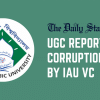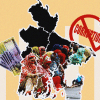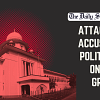Reforming the culture of student politics is crucial

A recent Prothom Alo survey—where 93 percent of respondents, or over 326,000 people, supported banning student politics—reflects widespread frustration and disillusionment with the current culture of student politics in Bangladesh. This overwhelming sentiment cannot be dismissed lightly. For far too long, student wings of political parties have exercised unchecked control over university campuses, often resorting to violence, intimidation, and coercion to maintain their dominance. In particular, the crimes and abuses committed by Chhatra League over the last 15 years have understandably led many to conclude that banning student politics altogether is the only solution.
However, the simplistic manner in which such surveys are framed misses the critical point that it's not student politics per se—but rather party-based student politics—that is problematic. Unfortunately, much of the discussion and reaction revolving around this issue seems to stem from this faulty premise. The decision of the 19 public educational institutions including 11 universities and six medical colleges that have recently prohibited student politics, with 13 of them simultaneously banning politics for teachers and staff, is also based on this premise. "Ban student politics" has become a rallying cry since the fall of the Awami regime on August 5.
However, while we understand the reasons behind the public outcry, we must also recognise the vital role that student politics, when properly structured and purpose-driven, can play in representing student interests and addressing legitimate grievances within our educational institutions. The very uprising that ousted the Awami League government owes to the leadership of largely nonpartisan but politically conscious students. Among them were also students tied to rival political parties, many of whom sacrificed their lives. But they left behind their political identity when they joined hands with other students for a cause that unified the whole nation.
The history of student politics in Bangladesh is replete with such glorious moments transcending party lines. Students being exploited by political parties to do their bidding form the other stream of this history, and it is this stream that needs to be rectified. Interestingly, we don't even need a new law or ordinance for that. The Representation of the People Order (RPO) already prohibits political parties from having any affiliated student or teacher organisations. However, we have seen how political parties bypassed this law on technicalities, with Awami League calling Chhatra League a "brotherly organisation", and BNP calling Chhatra Dal an "associate organisation" with its own constitution. Preventing such manipulations can put an end to the culture of party-based politics on campuses, and this is where we should focus.
The rights of students or teachers to engage in political activities are inalienable, but they can do so on their own time and outside the campus. But pursuing their political rights or agenda at the expense of general students and teachers is unacceptable. There is a fine line to balance here. So, instead of banning student politics altogether, university administrations should ban party-based politics on campus, activate and empower student unions to better protect student interests, and ensure academic and intellectual freedoms so that they can grow to be the leaders we need. Political influences in teacher recruitment, dormitory seat distribution, and other relevant areas also must stop. No party should be given the chance to exploit our universities again.


 For all latest news, follow The Daily Star's Google News channel.
For all latest news, follow The Daily Star's Google News channel. 











Comments